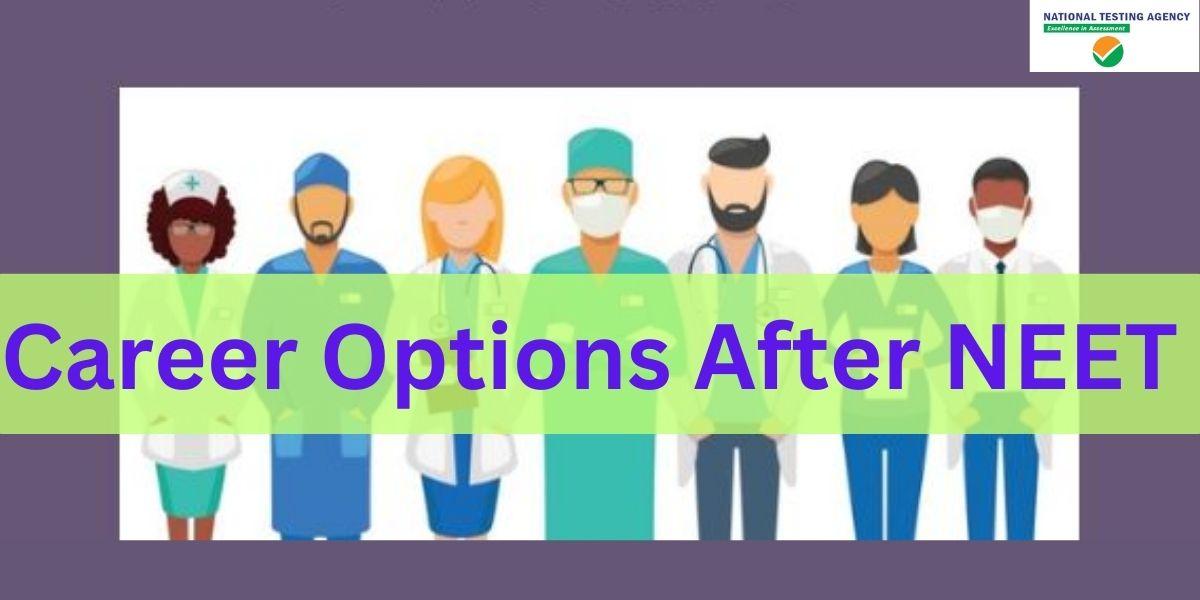Table of Contents
NEET is the largest entrance exam in India for college admission after 12th class if we consider the number of students participating in the exam. The NEET exam is taken by around 25 lakh students every year to fulfill their dream of becoming a doctor.
After the merger of different medical exams in NEET, the entrance exam is now the pathway to pursue different medical courses apart from MBBS and BDS. In this article, we will explore the list of best career options after NEET exam. Along with this, we will also explore the average salary that students graduating from these top career options after NEET obtain.
Career Options After NEET
Becoming a doctor is dream of many students and parents in India. But to earn the white cloak, students must work hard and even require luck on their side. Due to fierce competition, many students are enable to get good rank in the NEET exam and couldn’t pursue MBBS in any government or private college. Due to lack of other career options after clearing the NEET exam, many students go astray.
Apart from MBBS and BDS, many other courses with paying salaries are offered through the NEET exam. The NEET UG 2025 exam’s application form is ongoing. The NEET UG 2025 exam will be held on May 04, 2025.
After NEET Which Course is Best
Students who clear the NEET exam can get admission into several popular courses like MBBS (Bachelor of Medicine and Bachelor of Surgery), BDS (Bachelor of Dental Surgery), BHMS (Bachelor of Homeopathic Medicine and Surgery), BAMS (Bachelor of Ayurvedic Medicine and Surgery), BUMS (Bachelor of Unani Medicine and Surgery), BSc Nursing, Bachelor’s in Veterinary Science (BVSc), BPT (Bachelor of Physiotherapy), BSMS (Bachelor of Siddha Medicine and Surgery), BYNS (Bachelor of Naturopathy and Yoga systems), BVSc & AH (Bachelor of Veterinary Science and Animal Husbandry), and other paramedical courses.
Courses to do After NEET
Many students believe that the only choice available to them is to pursue MBBS if they pass the NEET test. However, the subject of medicine is very diverse, therefore there are several paths you can take. After taking the NEET exam, you might choose the following eight career possibilities instead of becoming an MBBS. Check the list of popular courses after clearing NEET.
MBBS
An undergraduate medical degree known as Bachelor of Medicine and Bachelor of Surgery (MBBS) is the foundation of becoming a medical doctor. Programs usually last five to six years and provide intensive instruction in medical sciences, clinical skills, patient care and patient diagnosis and treatment the options mainly choose after cracking NEET exam.
Medical professionals with an MBBS degree have a wide range of tasks, such as treating and diagnosing patients, managing illnesses and injuries, writing prescriptions, doing physical examinations, and deciphering test results.
BDS
Most students who do not wish to become MBBS choose to become dentists, also known as dental surgeons. Candidates who want to become a dentist after 12th must choose for the BDS course after NEET. Dentists are healthcare professionals with a focus on diagnosing, treating, and preventing oral health disorders. In order to ensure that each patient receives comprehensive dental care, dentists perform thorough oral examinations, diagnose dental conditions, and create treatment plans for procedures like fillings, root canals, and extractions. They also prescribe medications and educate patients about oral health.
BAMS
After passing the BAMS course, becoming an Ayurvedic doctor will be an additional career option following NEET. The goal of the BAMS course is to offer comprehensive, all-encompassing instruction for Ayurvedic healing. After finishing, a person can work as an Ayurvedic surgeon or physician.
BHMS
BHMS is an additional alternative medicine technique that utilizes the homeopathic science. In India and outside, there is a high demand for homeopathic physicians. After passing the NEET and completing the BHMS programme, you can work as a homeopathic physician. After finishing the course, you have a fantastic job as a practicing homeopathic physician.
BUMS
Unani science is covered in this UG degree under the Unani medicine and surgery stream. After passing this course with success, one becomes known as a Hakim, or doctor. As one of the most sought-after degrees in Unani sciences, it is sufficient to secure employment following 5.5 years of education, which includes a full year of internship training. Once more, the educational prerequisites are unchanged; students who speak Urdu fluently are given preference.
BSMS
Siddha medicine’s science, or BSMS, is categorized within the AYUSH system. After passing the NEET eligibility exam and completing the five and a half years of coursework, which consists of both classroom instruction and an internship, you can become a doctor of Siddha. If alternative medicine piques your curiosity, BSMS is a traditional medical technique that has gained prominence recently.
BPT
The 4.5-year study covers the foundations of human anatomy, clinical biochemistry, exercise therapy, human physiology, and electrotherapy. It also includes a 6-month internship program. In addition, general surgery, general medicine, orthopaedics, neurology, and cardiorespiratory to practice physiotherapy are some of the other clinical courses covered here. The MBBS course’s minimal academic prerequisite is still in place.
BSc Nursing
The nursing profession is committed to enhancing the well-being of individuals and communities by assisting individuals, families, and communities in lowering their risk of sickness and providing medical care when required. In addition to assessing patients’ conditions, nurses also develop care plans, administer direct patient care, keep an eye on vital signs, dispense medication, perform medical procedures as needed, and collaborate with healthcare teams to deliver comprehensive and efficient care.
BVSc (Bachelor of Veterinary Science)
The BVSc, or Bachelor of Veterinary Science, is an undergraduate program in veterinary science that lasts five years and is designed to provide the information needed to care for, breed, and nourish animals. Candidates who identify as animal lovers and who wish to work for or own an organization that breeds and cares for animals and pursue a career in animal husbandry should take the BVSc course. The BVSc course includes everything from animal physiology and anatomy to animal surgery and medicine.
NEET Jobs List with Salary
The list of career opportunities after NEET with the salary offered after its completion is provided below to help students in choosing the suitable alternative accordingly. The salary figure given below is the starting salary as per the trusted job statistics portal. check all career option for NEET candidates for jobs list with salary.
| Course Name | Average Starting Salary (Per Annum) |
| MBBS | Rs.4 lakhs to Rs.13 lakhs |
| BDS | Rs.2 lakhs to Rs.7 lakhs |
| BAMS | Rs.4 lakhs to Rs.7 lakhs |
| BHMS | Rs.2 lakhs to Rs.8 lakhs |
| BUMS | Rs.2 lakhs to Rs.6 lakhs |
| BSMS | Rs.3 lakhs to Rs.7 lakhs |
| BVSc | Rs.2 lakhs to Rs.8 lakhs |
| BSc Nursing | Rs.2 lakhs to Rs.10 lakhs |
| BPT | Rs.2 lakhs to Rs.6 lakhs |
NEET Salary with Profession
The salary of a doctor who has qualified through NEET (National Eligibility cum Entrance Test) can vary significantly depending on their specialization, experience, and the type of healthcare facility they work in. Here’s an overview of typical earnings at various stages:
MBBS Internship and Junior Residency
Stipend during MBBS Internship: After clearing NEET and completing MBBS, students have a one-year mandatory internship. Stipends range from ₹15,000 to ₹25,000 per month, depending on the state and institution.
Junior Residency: After the internship, doctors can work as junior residents in hospitals, with salaries typically ranging from ₹60,000 to ₹80,000 per month in government hospitals.
PG and Specialization Stipends
PG Residency Stipend (MD/MS): Postgraduate residents (MD/MS) often earn stipends of around ₹60,000 to ₹90,000 monthly, depending on the hospital.
Super Specialization (DM/MCh): For super-specializations, stipends may go up to ₹1,00,000 per month.
Post-MBBS Jobs (General Practice)
Government Hospitals: Government doctors earn ₹50,000 to ₹80,000 per month as entry-level salaries, with benefits and pension.
Private Hospitals and Clinics: Starting salaries in private hospitals can vary from ₹40,000 to ₹1,00,000, depending on the location and reputation of the hospital.
Senior Doctors and Specialists
Government Specialists: Senior specialists in government hospitals may earn from ₹1,20,000 to ₹2,00,000 per month with additional perks.
Private Sector: Specialists in private hospitals may earn from ₹1,50,000 to ₹3,00,000 or more monthly. Highly experienced specialists, especially in high-demand fields like cardiology or oncology, can earn significantly higher.
Private Practice and Consulting
Doctors with their own clinics or consulting practices can have variable incomes, depending on factors like reputation, location, and patient volume. Successful private practitioners can earn anywhere from ₹1,00,000 to ₹10,00,000 or more monthly.
Other Roles (e.g., Academics, Research)
Doctors who go into academics, medical research, or administration may also have lucrative careers, with salaries typically ranging from ₹60,000 to ₹1,50,000 monthly in entry roles, which can increase over time.
Top 20 Career Options After NEET Other Than MBBS
After qualifying for the NEET (National Eligibility cum Entrance Test) exam, there are several career options besides pursuing an MBBS (Bachelor of Medicine and Bachelor of Surgery). Here are some alternative career paths:
1. BDS (Bachelor of Dental Surgery)
- Focus on dental health and surgery.
- Involves the study of dental issues, prevention, and treatment.
2. BAMS (Bachelor of Ayurvedic Medicine and Surgery)
- Specializes in Ayurvedic medicine, a traditional system of healing in India.
- Involves herbal medicine, dietary practices, and lifestyle adjustments.
3. BHMS (Bachelor of Homeopathic Medicine and Surgery)
- Focuses on homeopathy, a system of alternative medicine.
- Involves treating patients with highly diluted substances.
4. BUMS (Bachelor of Unani Medicine and Surgery)
- Concentrates on Unani medicine, an ancient Greek-Arabic medical system.
- Emphasizes treatment using natural remedies.
5. BPT (Bachelor of Physiotherapy)
- Involves the study of physical therapy and rehabilitation.
- Focuses on helping patients recover mobility and function.
6. B.Sc. Nursing
- Prepares students for a career in nursing and healthcare.
- Involves patient care, medical procedures, and healthcare management.
7. B. Pharm (Bachelor of Pharmacy)
- Deals with the study of pharmaceutical sciences.
- Involves the preparation, dispensing, and proper utilization of drugs.
8. B.Sc. in Medical Laboratory Technology (MLT)
- Focuses on diagnostic laboratory work.
- Involves performing tests that aid in the diagnosis and treatment of diseases.
9. B.Sc. in Radiography
- Specializes in medical imaging techniques like X-rays, MRI, and CT scans.
- Involves working with radiographic equipment and assisting in diagnosis.
10. B.Sc. in Nutrition and Dietetics
- Concentrates on nutrition, diet planning, and management.
- Involves promoting healthy eating habits and dietary management for various health conditions.
11. B.Sc. in Biotechnology
- Focuses on the use of biological processes in technology and medicine.
- Involves genetic research, pharmaceuticals, and bioengineering.
12. B.Sc. in Cardiovascular Technology
- Deals with the diagnosis and treatment of heart and blood vessel conditions.
- Involves working with cardiovascular equipment and assisting in surgeries.
13. B.Sc. in Respiratory Therapy
- Focuses on treating patients with breathing or cardiopulmonary disorders.
- Involves working in critical care settings and providing respiratory support.
14. B.Sc. in Dialysis Technology
- Specializes in treating patients with kidney failure.
- Involves operating dialysis machines and monitoring patients during treatment.
15. B.Sc. in Occupational Therapy
- Focuses on helping individuals regain and improve their daily living skills.
- Involves therapeutic techniques to enhance physical and cognitive abilities.
16. B.Sc. in Anesthesia Technology
- Involves assisting anesthesiologists during surgeries.
- Focuses on managing anesthesia equipment and patient monitoring.
17. Health Administration and Management
- Involves managing healthcare facilities, services, and systems.
- Requires skills in healthcare policies, hospital administration, and management.
18. Medical Transcriptionist
- Involves converting voice-recorded medical reports into written texts.
- Requires knowledge of medical terminology and excellent typing skills.
19. Forensic Science
- Focuses on applying scientific methods to solve crimes.
- Involves analyzing evidence, crime scene investigation, and legal proceedings.
20. Genetic Counseling
- Involves advising individuals and families on genetic disorders.
- Requires knowledge of genetics and counseling skills.
These career paths provide diverse opportunities in the healthcare and allied sectors, allowing you to make a significant impact without pursuing an MBBS degree.





 Join ONE-Pro-Max - MAHAPACK for NEET-UG ...
Join ONE-Pro-Max - MAHAPACK for NEET-UG ...
 ONE Pro Max - MAHAPACK for NEET UG 2027 ...
ONE Pro Max - MAHAPACK for NEET UG 2027 ...
 NEET 2025 Safe Score By Category for MBB...
NEET 2025 Safe Score By Category for MBB...
